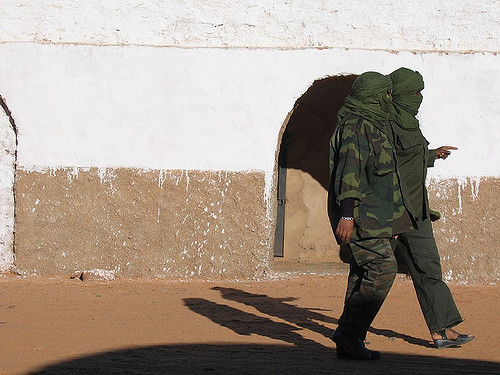Updated
Western Sahara: Where is Algeria? – Robert M. Holley

Female Polisario soldiers in refugee camp in southern Algeria Photo: Nick Brooks
Robert M. Holley
August 14, 2018
In 2007, shortly after Morocco tabled its initiative for autonomy to resolve the dispute in Western Sahara, David Welch, at that time the Assistant Secretary of State for the Middle East, told a Congressional committee that the United States welcomed Morocco’s proposal and found it “serious and credible.” Conversely, he testified, “the Polisario proposal does not seem, in our judgment, to contain new ideas.” The Moroccan initiative was a substantial goodwill gesture to address repeated calls since 2003 from the Security Council for the Parties to move towards negotiating a “mutually acceptable political solution,” meaning a solution that would require fundamental compromise from all Parties.
Little has changed. Most of the international community still describes the Moroccan initiative in the same terms, “serious, credible, and realistic.” And most still see nothing new in the Polisario’s continued insistence on a referendum on independence that the UN Security Council abandoned as unworkable in 2003.
When the Security Council renewed the peacekeeping mandate for Western Sahara last April, it called for compromise, realism, and for the willingness of all Parties to show a greater commitment to finding a solution.
That “all Parties” phrase was pointed directly at Algeria, which continues to pretend that it has no intrinsic stake in this dispute. It claims it is only supporting the principle of self-determination. Nothing could be further from the truth and no one in the international community accepts the Algerian position at face value. Algeria has only been allowed to stand on this flimsy position because, until now, the international community has preferred to allow the situation in Western Sahara to remain stalemated rather than take firmer action to move it to a solution.
But it seems the political tides may be shifting in the Sahara.
The pointed call for greater cooperation from all Parties and the insistence on “realism” clearly signals that the international community is growing weary with Algerian intransigence and Polisario’s continued insistence on ideas the Security Council has long abandoned.
Algeria arms, trains and diplomatically supports the Polisario, which resides on sovereign Algerian territory. Without Algerian support, Polisario would soon cease to exist. Everyone knows this and it now appears that the Security Council may be preparing to hold Algeria accountable.
Following the closed door briefing of the Security Council last week by the Secretary General’s new Personal Envoy, Horst Kohler, Morocco’s Ambassador to the United Nations, Omar Hilale, gave an interview to the press in which he insisted that Morocco would not agree to further negotiations unless Algeria was included as a direct participant in the talks. This is no more than recognition of the reality of the origins and continuation of the dispute over Western Sahara. And it is a recognition of the self-evident reality that there can be no solution to this problem until Algeria is willing to assume its responsibility and sit down at the bargaining table to work out the kind of “mutually acceptable political solution” that the Security Council demands. Algeria can no longer pretend that it is not a direct Party to this issue and avoid its responsibility in finding a fair compromise political solution. Nor can the Security Council continue to accept that a solution is possible unless Algeria accepts its responsibility.
If it is serious about ending this problem, the Security Council must make clear to Algeria that lack of progress towards a negotiated solution will be placed squarely at Algeria’s doorstep if it continues its attempts to avoid direct responsibility. If it is unwilling to assign responsibility for failure where it belongs, the Council should stop pretending that it is interested in a solution and make plain that it will only reengage in Western Sahara if or when it becomes clear that Algeria and the Polisario are prepared to take the kinds of meaningful steps towards compromise that Morocco has taken already.
Morocco has laid a perfectly reasonable proposal for a compromise political solution on the table. There still has been no meaningful counter offer from either Algeria or the Polisario, as Assistant Secretary Welch made clear in his testimony before Congress in 2007. It’s an old rule in diplomacy that you cannot substitute “nothing” for “something.” The Security Council needs to tell Algeria and the Polisario that the time has come for them to get off the fence and put some realistic compromise of their own on the table if they don’t like the Moroccan proposal. Then the Parties will have “something” to negotiate.
